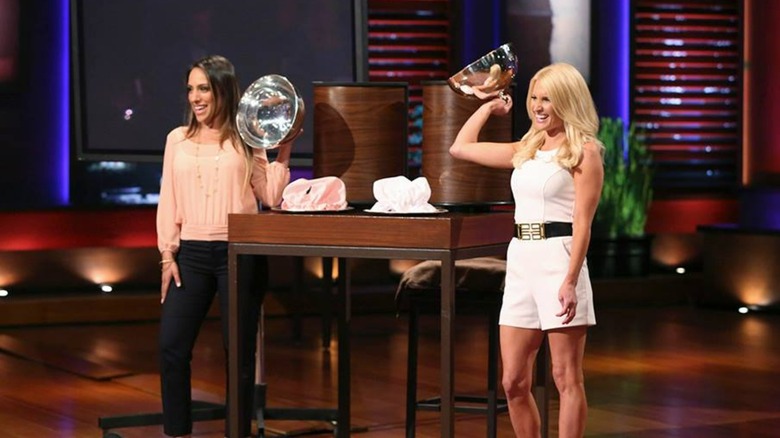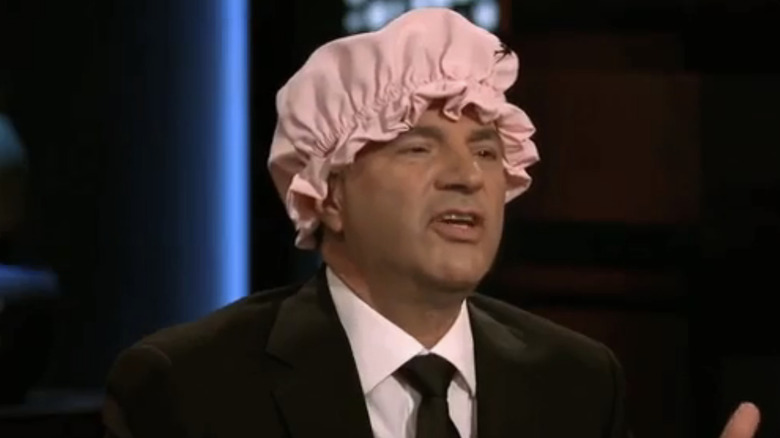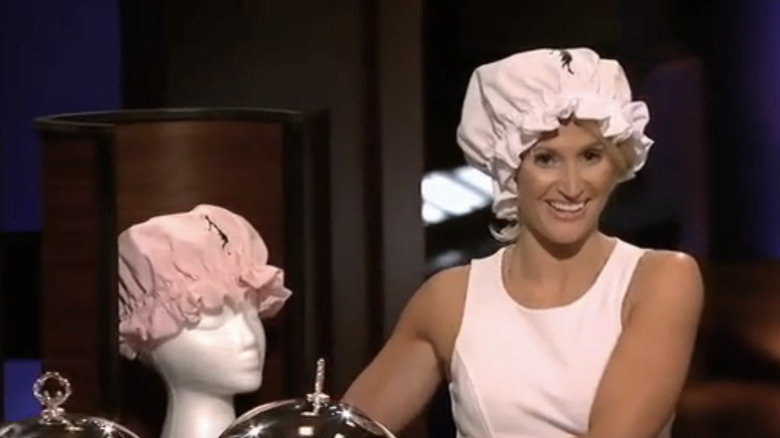What Happened To Kookn Kap From Shark Tank?
"Shark Tank" has featured its share of winners, losers, and the best kitchen tools and the most ridiculous inventions ever. While the inventors of Kookn Kap thought they had an award-winning recipe, they couldn't quite drum up the enthusiasm when they appeared on the show in 2013. Entrepreneurs Juli Deveau and Ozma Khan appeared during the fifth season of the show to showcase their product, which essentially boiled down to a hair bonnet that was to be worn while cooking.
Asking for $50,000 in exchange for 20% of the company, they argued that Kookn Kap was designed to keep your hair smelling fresh and food free. According to Shark Tank Blog, the two developed the idea for the product after a night of cooking and noticing their hair smelled afterward. Thus, they created Kookn Kap as a way to keep people's hair smelling fresh when cooking. While the two made an entrance even getting Shark Kevin O'Leary to don a pink bonnet, the two were unable to make a deal with the sharks.
Despite having a patent and a trademark to back up their product, Deveau and Khan were ultimately unable to convince the sharks of the Kookn Kap's worth. While some businesses manage to find success without a "Shark Tank" investment, Kookn Kap sadly wasn't destined to go on much further. Here's why the concept fell apart.
The shaky concept behind the Kookn Kap
The team behind Kookn Kap had the goal of keeping a cook's hair free from food odors. But why does hair soak up smells to begin with? According to Hair by L'Oreal, hair ranges from low porosity to high porosity. High porosity hair is particularly absorbent of smells, so protective styles like braids or buns help reduce the surface area available for scents to cling to. Hats — like the Kookn Kap — are another easy solution.
However, the sharks on "Shark Tank" pointed out some flaws with the product. For instance, Shark Lori Greiner questioned why cooks couldn't just use regular shower caps to protect their hair. Both Juli Deveau and Ozma Khan argued that the Kookn Kap was fire-resistant, as opposed to some shower caps, which are usually made with a flammable EVA plastic. That being said, other common shower cap fabrics like nylon and silk have similar burn rates as cotton and polyester, according to East Sussex Fire & Rescue Service. The Kookn Kap was made with a cotton and polyester blend.
Ultimately, the sharks weren't a fan of the way the caps looked, questioning if consumers would actually wear them. Despite a brief boom after the episode launched, their suspicions would be proven correct.
Kookn Kap didn't last long after 'Shark Tank'
Like other companies that didn't land a deal on "Shark Tank," Kookn Kap saw an initial jump in sales after its episode aired, and then everything went downhill from there. The business posted what would be its last Facebook update on February 3, 2014, thanking its fans for a "major spike in sales." The Kookn Kap Twitter account has also remained inactive since 2014, despite a December 2013 post claiming to have successfully sold thousands of the caps.
Kookn Kap's website has since been taken down, with Juli Deveau and Ozma Khan seeming to go their separate ways. Nevertheless, the business retains a few fans to this day. One Shark Tank Shopper review called the Kookn Kap "one of the very best items I've ever viewed on Shark Tank." Another customer sang the product's praises, saying her hair no longer smelled of fish after using the Kookn Kap. Both of these reviews were posted in 2017, mind you, so more than three years after the business shut down.


